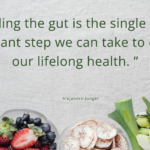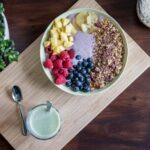Dairy can cause health issues in a lot of people from digestive upset and sinus congestion to inflammation, hormonal issues, and problems with the immune system. Don’t get me wrong, I love cheese, but as with most things, moderation is key. What is moderation? Well, that depends on individual circumstances. Moderation for me is completely different to moderation for my rapidly growing teenage son!
Below are some health considerations on dairy, which might help you define your needs.
Dairy Cows Are Stressed:
This could be due to the mass production and processing of modern-day dairy products, compared to those your great-grandparents may have consumed fresh from the farm cow. These days there is a massive consumer demand which requires farmers to have their dairy cows continually produce milk year-round, including when they are pregnant. A stressed cow is an inflamed and unhealthy cow as is the milk they produce. Due to the unnatural demands on dairy cows, they are susceptible to mastitis, parasites, bloat, acidosis (from too much grain which they are not designed to digest), and liver abscesses. While the Australian livestock organisations state that antibiotics are used sparingly, and milk is closely monitored for antibiotic residues, there are other compounds such as ionophores added to the grain feed while the cows are being milked to enhance their tolerance of the grains and prevent bloat, parasitic infection and increase weight and production. Residues of these can remain in the milk.
Dairy Foods Increase Growth Hormones:
The purpose of cow’s milk is to feed the calf and help it grow. Dairy milk contains naturally occurring hormones called insulin-like growth factor (IGF-1), which when fed to people, also increases circulating (IGF-1). This helps with bone growth, yes, but studies show that IGF-1 promotes cancer cell growth too- particularly breast, prostate, lung and colon cancers.
Dairy Foods Raise Estrogen:
Estrogen is needed to maintain a woman’s menstrual cycle, fertility and bone health. However, too much, or the wrong types of estrogen are associated with increased risk of some cancers, endometriosis, breast cancer, uterine or ovarian cancers and early puberty. Dairy foods contain estrogen due to the cows being milked throughout pregnancy.
But What About The Calcium For My Bones?
Calcium is just one of the nutrients important for maintaining bone health among other things in the body. However, dairy is certainly not the only dietary source of calcium and adequate calcium intake is achievable through other food sources such as sardines, salmon, eggs, spinach, broccoli, dried figs, molasses, sesame seeds, chia seeds. In fact, 2 eggs and a cup of cooked broccoli contain more calcium than a glass of milk.
What Counts As Dairy?
If your practitioner has asked you to avoid dairy, this means any product that comes from the milk of mammals, including cow, sheep or goat. You will need to avoid:
- Milk
- Lactose Free Milk
- Skim or Low Fat Milk
- Cheese
- Cream cheese
- Cheese spreads
- Butter
- Creme fraiche
- Kefir
- Ice-Cream
- Labna
- Yoghurt
Please note – Lactose-Free milk or other lactose-free food products may still contain dairy. Be sure to read the ingredients list carefully.
You may not have to avoid dairy 100% forever. Talk to your naturopath or nutritionist about the best options for you and your lifestyle.



